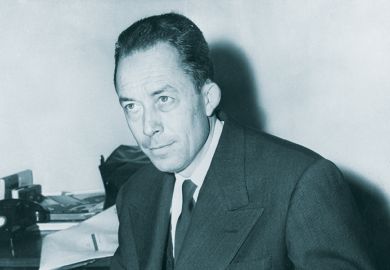The author of The Numinous Legacy is an amateur in the literal and best sense of the word. His work races along with a passionate love of his subject and a sense of personal commitment that must engage even the stoniest-hearted reviewer. But he is amateur also in the less happy sense that he is not fully equipped with the skills necessary for the task he has set himself (in spite of an Oxford DPhil in astrophysics). The result is an uneven book, with much of the material poorly organised, superficial and sometimes inaccurate.
This is a shame, because Adair Butchins's basic thesis - that pre-Copernican religion cannot be made to fit with post-Copernican cosmology - is a truth too seldom heeded. He points out that the displacement of humanity from its unique place in the universe has had a disproportionate effect on the three "western" religions of Judaism, Christianity and Islam. Much of the anthropocentric doctrine, especially in relation to eschatology, has been rendered untenable. By contrast the eastern traditions, whose vision of the ultimate unity of the universe has not depended upon humankind, have fared better. Such an analysis is supported by the comparative popularity of Buddhist and neo-Vedantic practices among western intellectuals.
Butchins considers the strategies adopted by religious apologists in the West since the 17th century. He concludes that they have kept the door open for some kind of divine creation, as a possibility at least, but have failed to justify any of the specific doctrines relating to sin, redemption and judgement, which lie at the heart of much religion.
This is an acute observation. A religion such as Christianity stands or falls by its practical value in helping ordinary people face the challenges of human living. It is the creationists and charismatics, defying science and offering a hands-on interventionist God, who fill their churches. Modernists and liberals, attempting to reconcile pre-Copernican dogma with modern science, see their pews emptying. A distant God, and a loss of immediacy, is the price they pay for a faith that is intellectually respectable.
Intellects do not come any more respectable than John Polkinghorne. He is a fellow of the Royal Society, former professor of mathematical physics at Cambridge and a past president of Queens' College in the same university. Compared with Butchins he is a consummate professional, a star among what he himself calls the "scientist-theologians". Yet his Faith, Science and Understanding displays exactly the weaknesses and strengths predicted by Butchins.
To be fair, Polkinghorne does not set out to tackle the central Christian issues of sin and redemption, of death and resurrection. His book is in fact something of a pot-pourri of lectures and papers prepared for other occasions and a revisiting of some themes on which the author has had some "second thoughts". But he does address the limitations, detected by Butchins, of a one-sided approach to theology. In discussing physicist Paul Davies, he writes of the "insubstantiality" of natural theology when isolated from "the encounter with the sacred, preserved and propagated in the world faith traditions". And he commends theologian Tom Torrance for insisting that natural and revealed theology belong together.
This is of no avail, however, without some practical way of dealing with the contradictory revelatory claims of rival religions, and of reconciling "revealed" dogmas with empirical science. The first of these issues is, in Polkinghorne's view, one of the most important items on the contemporary theological agenda, but he confesses "I regret that I have nothing new to add" on the subject.
On the second question, he repeats and defends his claim that "revelation bears analogy with the role played by observations and experiments in science". There is, however, an asymmetry in this analogy. Scientific observations and experiments can be useful only in the context of some hypothesis that they support or falsify. Religious revelation, if it is specific enough to be useful in doctrinal formulations, is already theory-laden. It cannot therefore be used independently to support or falsify the religious claims associated with it.
Taken together, these books demonstrate the continuing thirst for justice to be done to both dimensions in the science-and-religion debate. They also show, in rather different ways, how crucial to that outcome is the relation between theory and practice within each of the disciplines.
Revd Anthony Freeman is managing editor, Journal of Consciousness Studies .
The Numinous Legacy: Modern Cosmology and Religion
Author - Adair Butchins
ISBN - 0 9539818 0 0
Publisher - Albatross Press, MM House 3-7 Wyndham Street Aldershot, GU12 4NY
Price - £16.95
Pages - 292
Register to continue
Why register?
- Registration is free and only takes a moment
- Once registered, you can read 3 articles a month
- Sign up for our newsletter
Subscribe
Or subscribe for unlimited access to:
- Unlimited access to news, views, insights & reviews
- Digital editions
- Digital access to THE’s university and college rankings analysis
Already registered or a current subscriber? Login



